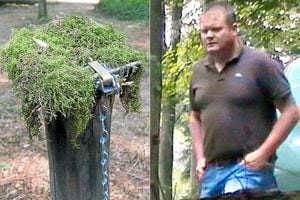Gamekeeper fined for Shropshire bird of prey trap
A part-time gamekeeper has been ordered to pay more than £500 by a court – after admitting setting an illegal trap in Shropshire designed to harm birds of prey.

Wayne Edward Priday, of Leintwardine, was caught after investigating officers from charity the Royal Society for the Protection of Birds visited a pheasant release pen in Elton, near Ludlow, in August.
Guy Shorrock, one of the RSPB officers, said he found a pole trap that had been placed on top of a post and camouflaged with moss.
"Pole traps are devices that have been banned from use since 1904," he added. "They consist of a powerful spring-trap typically placed on top of a post or pole. Birds of prey will use these elevated positions as a vantage point and the traps are strategically placed where they will hunt.
"The pole trap was disabled and covert surveillance was set up to monitor who was responsible.
"The following morning Priday was filmed visiting the site.
"Clearly puzzled that the trap had been sprung, Priday unfastened the spring-trap and took it away in his vehicle. West Mercia Police visited the site and Priday was later interviewed. He eventually accepted setting the trap, though claimed it was for squirrels."
Priday, 39, pleaded guilty to using a pole trap when he appeared at Hereford Magistrates Court. He was fined £375 and ordered to pay £170 court costs.
Mr Shorrock said the RSPB released its annual Birdcrime report last week with much of it focusing on continuing problems with illegal persecution of birds of prey. He added this was another case which highlighted the threats such "magnificent birds" faced.
"There are a number of fantastic birds of prey in the forests around Ludlow including red kites and buzzards," Mr Shorrock said.
"However, we believe this trap was probably set for a goshawk, a very rare bird of prey with perhaps only 500 pairs in the UK.
"It is incredible that people still choose to use such a barbaric and outdated device. Fortunately, we believe we found the trap before it was able to cause any injury."





